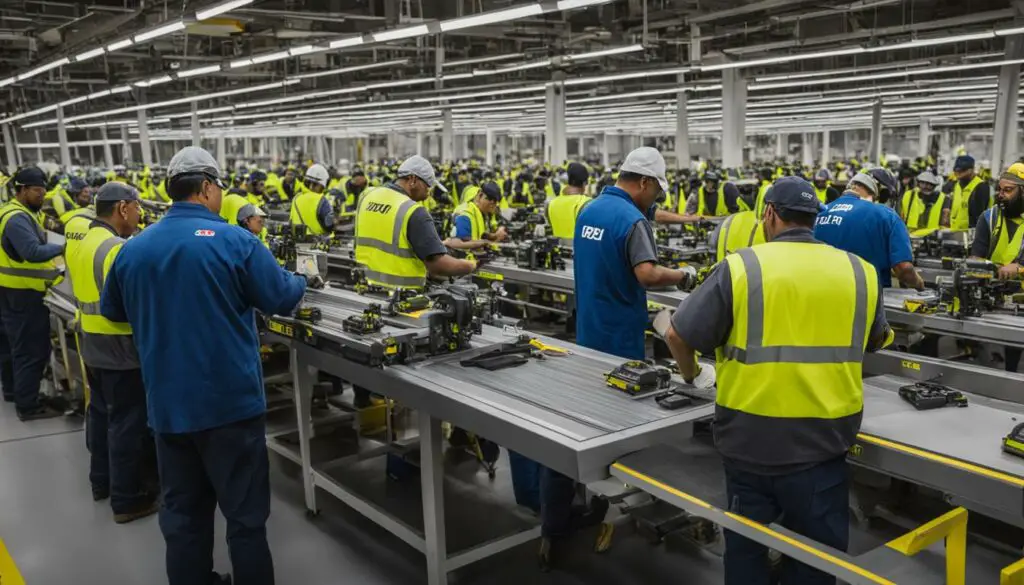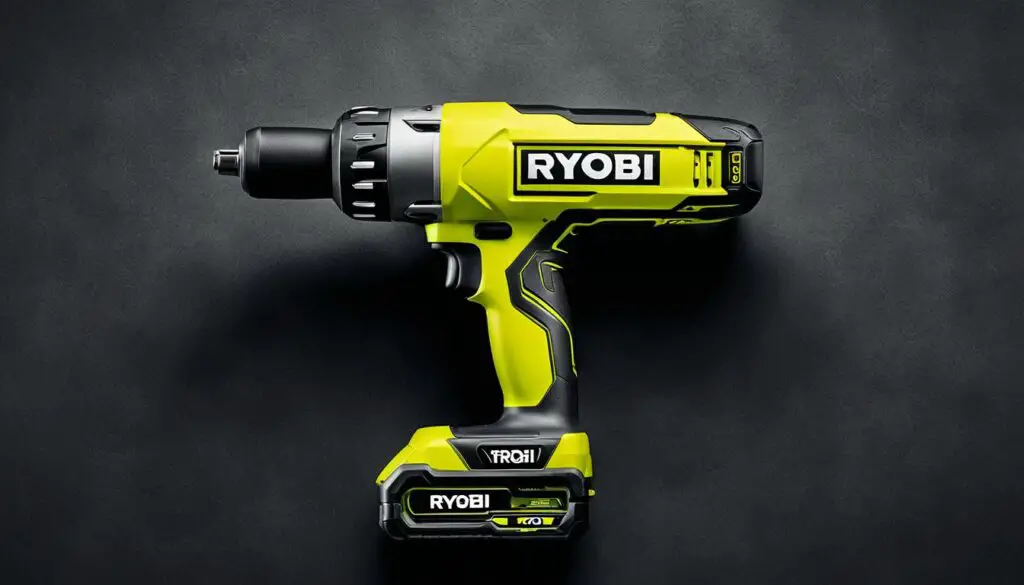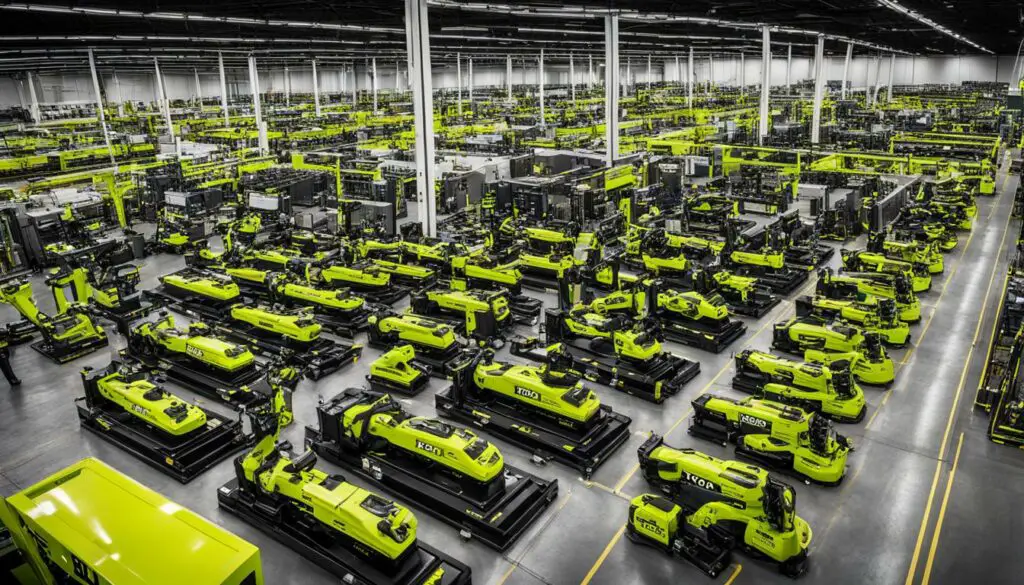If you’re familiar with power tools, chances are you’ve heard of Ryobi. This popular brand is known for its quality tools that cater to the needs of both DIYers and professionals. But have you ever wondered who is behind the creation of these reliable and efficient tools?
In this article, we will dive into the world of Ryobi and uncover the manufacturer responsible for bringing these tools to life. From the brand’s origins to its current reputation in the industry, we’ll explore the story behind Ryobi and shed light on the company’s dedication to innovation and customer satisfaction.
So, if you’re curious about who makes Ryobi tools and want to learn more about the company behind this trusted brand, keep reading!
Key Takeaways:
- Ryobi is a well-known brand in the power tool industry.
- Techtronic Industries (TTI) serves as the parent company of Ryobi tools, holding a significant role in shaping the brand’s future direction.
- Ryobi tools cater to the needs of both DIYers and professionals.
- The brand’s origins and milestones contribute to its strong reputation.
- Ryobi is part of a parent company that supports its global reach.
The Origin of Ryobi Brand and Its Evolution
In this section, we will delve into the origins of the Ryobi brand, providing a historical perspective and discussing key milestones that shaped its journey. We will also explore how Ryobi expanded its brand to become a household name, captivating the attention of both DIYers and professionals.
Ryobi’s Beginnings: A Historical Perspective
Ryobi was founded in Japan in 1943 as a manufacturer of die-cast products. The company’s original name was Ryobi Seisakusho Co., Ltd., and it started with a focus on producing printing equipment. Over the years, Ryobi expanded its product range and entered various industries, including automotive components and telecommunications.
However, it was in the 1960s that Ryobi made a significant shift and entered the power tools market. Recognizing the demand for high-quality and innovative tools, Ryobi began producing power drills, saws, and other tools that quickly gained popularity for their performance and reliability.
Timeline: Major Milestones in Ryobi’s History
| Year | Milestone |
|---|---|
| 1968 | Ryobi introduces its first power drill, marking its entry into the power tools market. |
| 1985 | Ryobi launches the first portable gas-powered generator, expanding its product range. |
| 1991 | Ryobi introduces its signature ONE+ system, a battery platform that is compatible with multiple power tools. |
| 1998 | Ryobi enters the electric outdoor tools market with the launch of its first electric lawnmower. |
| 2005 | Ryobi releases its first hybrid portable fan, combining the convenience of battery-powered and electric-powered operation. |
Brand Expansion: How Ryobi Became a Household Name
Ryobi’s commitment to innovation and delivering quality tools led to its rapid expansion in the tool market. The brand’s dedication to meeting the needs of DIYers and professionals alike garnered a loyal following and established Ryobi as a trusted and recognizable name in the industry.
Through strategic partnerships, collaborations, and continuous product development, Ryobi expanded its product offerings to cater to a wide range of applications and user preferences. From power drills and saws to outdoor equipment and much more, Ryobi became synonymous with reliable performance and cutting-edge technology.
Today, Ryobi continues to evolve and introduce new tools and technologies that empower users to tackle various projects with ease. With a rich history and a commitment to innovation, Ryobi remains a leader in the power tools market, providing quality tools that inspire creativity and enable users to achieve their goals.
Who Makes Ryobi Tools

Ryobi is manufactured by Techtronic Industries (TTI), a global leader in the power tool industry. TTI is known for its commitment to innovation and quality, making it an ideal partner for producing Ryobi tools.
With decades of experience and expertise, TTI has established itself as a trusted name in the industry. The company has a strong reputation for delivering reliable, durable, and high-performance tools to professionals and DIY enthusiasts alike.
By leveraging TTI’s manufacturing capabilities and extensive research and development resources, Ryobi tools are able to meet the demands of a wide range of applications. From power drills and saws to trimmers and blowers, Ryobi offers a comprehensive lineup of tools that cater to various needs and skill levels.
| Key Information | Details |
|---|---|
| Manufacturer | Techtronic Industries (TTI) |
| Industry Expertise | Decades of experience in power tool manufacturing |
| Commitment to Quality | Delivering reliable, durable, and high-performance tools |
| Research and Development | Leveraging extensive resources for continuous innovation |
| Wide Product Range | Catering to various needs and skill levels |
The Parent Company: Techtronic Industries (TTI)
Techtronic Industries (TTI) serves as the parent company of Ryobi tools, holding a significant role in shaping the brand’s future direction. With its global reach and extensive portfolio of brands, TTI has established itself as a prominent player in the power tool industry.
Understanding TTI’s Global Reach
TTI operates on a global scale, with a presence in over 30 countries. With a strong foothold in North America, Europe, and Asia, TTI’s reach extends to diverse markets and customer bases. This expansive global network allows TTI to leverage its resources, expertise, and innovation, benefiting Ryobi and other brands under its umbrella.
Other Brands Under TTI’s Umbrella
TTI is home to a wide range of notable brands alongside Ryobi. These include Milwaukee, AEG, Hoover, and Hart, among others. Each brand offers unique products designed to meet the specific needs of consumers, allowing TTI to cater to a broader customer base and target various market segments.
How TTI Shapes the Future of Ryobi
As the parent company, TTI plays a vital role in shaping Ryobi’s future trajectory. TTI provides resources and support to drive innovation, research, and development, enabling Ryobi to introduce new products and advancements in line with market demands. Additionally, TTI’s global presence and industry expertise empower Ryobi to expand its market reach and maintain its position as a leading power tool brand.

Innovations and Technology in Ryobi Tool Manufacturing
Ryobi has established itself as a leader in the power tool industry, delivering innovative solutions that cater to the evolving needs of both professionals and DIY enthusiasts. With a focus on cutting-edge technology and user-friendly designs, Ryobi continues to push the boundaries of what power tools can achieve.
Advances in Power Tool Technology
One of the key reasons behind Ryobi’s success is its commitment to advancing power tool technology. Through extensive research and development, Ryobi has introduced groundbreaking features that enhance performance, efficiency, and overall user experience. From brushless motors that deliver more power and longer runtime to intelligent battery systems that provide real-time performance monitoring, Ryobi continues to innovate and set new industry standards.
Ryobi’s Unique Selling Propositions in Tools
What sets Ryobi apart from its competitors are the unique selling propositions it offers in the tools industry. Ryobi tools are designed with the end-user in mind, combining durability, versatility, and affordability. Whether you’re a professional contractor or a homeowner tackling DIY projects, Ryobi tools provide a reliable and cost-effective option without compromising on quality or performance. This commitment to delivering exceptional value has made Ryobi a trusted brand among consumers.
A Glance at Future Technological Enhancements
As technology continues to advance, Ryobi is at the forefront of integrating innovative features into its power tools. From improved battery performance to enhanced connectivity options, Ryobi is constantly working on future technological enhancements that will further streamline workflows and empower users with greater control and efficiency. By staying ahead of the curve, Ryobi ensures that its customers have access to the latest advancements in power tool technology.

| Features | Advancements |
|---|---|
| Brushless Motors | Enhanced power and longer runtime |
| Intelligent Battery Systems | Real-time performance monitoring |
| Durable and Versatile Designs | Reliable performance for professionals and DIYers |
| Affordability | High-quality tools at a reasonable price |
| Future Technological Enhancements | Improved battery performance and enhanced connectivity |
Ryobi’s Production Facilities Around the World
Ryobi’s global presence is supported by its production facilities located around the world. These state-of-the-art facilities play a crucial role in manufacturing Ryobi tools to meet the demands of customers worldwide. By strategically setting up production facilities in different regions, Ryobi ensures efficient distribution and delivers high-quality tools to its loyal customer base.
With a focus on innovation and precision engineering, Ryobi’s production facilities employ advanced manufacturing processes and technologies. This enables them to produce a wide range of power tools that are known for their durability, performance, and reliability.

By establishing production facilities worldwide, Ryobi also taps into local talent and resources, fostering collaboration and adaptability. This allows the brand to stay agile in responding to market trends and customer needs.
Moreover, Ryobi’s commitment to sustainable practices extends to its production facilities. The company integrates eco-friendly processes and materials into its manufacturing operations, reducing waste and promoting environmental stewardship.
Overall, Ryobi’s global network of production facilities showcases its dedication to providing top-quality power tools to professionals and DIY enthusiasts alike. By leveraging its manufacturing capabilities across different regions, Ryobi continues to solidify its position as a leading brand in the power tool industry.
Quality Control: Ensuring Ryobi’s Reputation
Maintaining quality and a strong reputation is crucial for Ryobi. In this section, we will delve into the quality assurance process implemented by Ryobi, its commitment to providing durable and reliable tools, and how user feedback plays a role in continuous improvement.
The Quality Assurance Process
Ryobi understands the importance of delivering high-quality products to its customers. That’s why they have a rigorous quality assurance process in place. Every Ryobi tool undergoes extensive testing and inspection to ensure that it meets the brand’s stringent standards. From the initial design phase to the final manufacturing stages, Ryobi’s quality control team meticulously checks each tool for performance, durability, and safety.
By adhering to strict quality control measures, Ryobi can identify and address any potential issues early on, guaranteeing that their tools consistently meet the expectations of their customers.
Ryobi’s Commitment to Durable and Reliable Tools
Ryobi is committed to providing durable and reliable tools to its customers. They understand that professionals and DIY enthusiasts alike rely on their tools to get the job done efficiently and effectively. That’s why Ryobi puts a strong emphasis on using high-quality materials and employing advanced manufacturing techniques.
From robust housings to precision-engineered components, each Ryobi tool is built to withstand demanding tasks and deliver reliable performance. This commitment to durability ensures that users can rely on Ryobi tools to tackle any project with confidence.
User Feedback and Continuous Improvement
User feedback plays a vital role in Ryobi’s continuous improvement process. Ryobi values the opinions and experiences of their customers and actively encourages them to provide feedback on their tools. By collecting user feedback, Ryobi gains valuable insights into how their tools are being used in real-world applications.
This feedback serves as a catalyst for continuous improvement, allowing Ryobi to make enhancements and updates to their products based on customer needs and preferences. Whether it’s addressing common issues or developing new features, Ryobi strives to incorporate user feedback to provide the best possible tooling solutions.
Ryobi in the Power Tool Market: Competition and Collaborations
The power tool market is highly competitive, and Ryobi has to navigate through it. In this section, we will analyze Ryobi’s market position, explore its strategic alliances and competitor dynamics, and uncover how Ryobi stays competitive in a crowded market.
Analysis of Ryobi’s Market Position
To understand Ryobi’s place in the power tool market, we need to examine its market position. Ryobi has established itself as a reputable brand known for delivering quality tools at affordable prices. With a wide range of products catering to both DIY enthusiasts and professionals, Ryobi has been able to capture a significant share of the market. Its commitment to innovation and customer satisfaction has further solidified its position as a trusted name in the industry.
Strategic Alliances and Competitor Dynamics
In order to thrive in the competitive power tool market, Ryobi has formed strategic alliances with other industry players. Through collaborations with suppliers, distributors, and technology partners, Ryobi has been able to expand its reach and enhance its product offerings. These alliances have allowed Ryobi to access new markets, leverage shared resources, and stay ahead of evolving customer demands. Additionally, understanding competitor dynamics is crucial for Ryobi to stay informed about market trends, pricing strategies, and product innovations. By closely monitoring its competitors, Ryobi can adapt its own strategies and maintain a competitive edge.
How Ryobi Stays Competitive in a Crowded Market
To stay competitive in a crowded power tool market, Ryobi focuses on three key areas. Firstly, Ryobi emphasizes continuous product development and innovation. By constantly improving existing products and introducing new ones, Ryobi stays relevant and meets the evolving needs of its customers. Secondly, Ryobi places a strong emphasis on customer satisfaction, ensuring that their tools are reliable, durable, and easy to use. This dedication to quality helps build brand loyalty and word-of-mouth recommendations. Lastly, Ryobi understands the importance of effective marketing and branding. By creating engaging advertising campaigns and establishing a strong online presence, Ryobi can effectively communicate its value proposition and differentiate itself from competitors.
| Competitor | Market Position | Key Strategies |
|---|---|---|
| DeWalt | Market Leader | Focus on professional-grade tools, extensive product range |
| Makita | Strong Market Presence | Emphasis on cordless tools and advanced technology |
| Milwaukee | Rapid Growth | Innovation-driven approach, strong brand loyalty |
| Bosch | Diverse Product Portfolio | Wide range of tools for various applications |
The Importance of Brand and Customer Loyalty to Ryobi
Building a strong brand and cultivating customer loyalty are essential for Ryobi’s ongoing success. In today’s competitive power tool market, where consumers have numerous options to choose from, brand loyalty plays a crucial role in establishing a loyal customer base and driving sales.
Ryobi has invested significant time and effort into building a reputable brand known for its quality, reliability, and innovation. Through continuous product development and a commitment to meeting customer needs, Ryobi has garnered a loyal following of DIY enthusiasts, homeowners, and professionals alike.
One of the key factors driving brand loyalty for Ryobi is its dedication to delivering high-performance tools that consistently meet or exceed customer expectations. Whether it’s a cordless drill, a power saw, or a gardening tool, customers rely on Ryobi for their projects, knowing that they can trust the brand to deliver reliable and durable products.
Furthermore, Ryobi places great importance on listening to its customers and taking their feedback into account. By actively engaging with its user community, Ryobi understands the evolving needs of its customers and is able to refine and improve its products accordingly. This customer-centric approach not only fosters trust and loyalty but also strengthens the brand’s reputation in the market.
Customer loyalty is crucial to Ryobi’s continued growth and success. It not only drives repeat purchases but also leads to positive word-of-mouth recommendations and referrals, further expanding the brand’s reach and customer base. Additionally, loyal customers are more likely to become brand advocates, sharing their positive experiences with others and influencing purchasing decisions.
To visually illustrate the importance of brand and customer loyalty, take a look at the chart below:
| Brand Loyalty | Customer Loyalty | |
|---|---|---|
| Enhanced Brand Recognition | ✔️ | ✔️ |
| Higher Customer Retention | ✔️ | ✔️ |
| Increased Customer Satisfaction | ✔️ | ✔️ |
| Positive Word-of-Mouth | ✔️ | ✔️ |
| Long-term Business Growth | ✔️ | ✔️ |
As can be seen from the chart, brand and customer loyalty contribute to various aspects of Ryobi’s overall success, including enhanced brand recognition, higher customer retention, increased customer satisfaction, positive word-of-mouth, and long-term business growth.
In conclusion, Ryobi understands the importance of building a strong brand and fostering customer loyalty. By consistently delivering quality products, actively engaging with customers, and prioritizing their needs, Ryobi has created a loyal customer base that continues to fuel its growth and success in the power tool market.
Conclusion
In this final section, we will assess Ryobi’s impact on the tool industry, provide insights into the brand’s future outlook, and offer final thoughts on Ryobi’s market leadership and innovative contributions.
Assessing Ryobi’s Impact on the Tool Industry
Ryobi has made a significant impact on the tool industry with its range of high-quality power tools. The brand’s commitment to innovation and technological advancements has revolutionized the way both DIY enthusiasts and professionals approach their projects. Ryobi’s tools have become a staple in workshops and households across the country, providing reliable performance and excellent value for money.
Future Outlook for Ryobi and Its Consumers
Looking ahead, Ryobi’s future outlook seems promising. The brand has consistently demonstrated its ability to adapt to changing market demands and introduce new products that meet the evolving needs of its consumers. With a strong focus on product development and advancements in technology, Ryobi is well-positioned to continue gaining market share and maintaining its reputation as a trusted name in the power tool industry.
Final Thoughts on Ryobi’s Market Leadership and Innovations
Ryobi’s market leadership can be attributed to its relentless pursuit of excellence and dedication to delivering tools that exceed customer expectations. The brand’s emphasis on quality control, customer feedback, and continuous improvement sets it apart from its competitors. Ryobi’s innovative features, such as their unique battery interchangeability and user-friendly designs, have redefined the power tool landscape and cemented their status as an industry leader.
In conclusion, Ryobi’s impact on the tool industry is undeniable. With a bright future ahead and a commitment to innovation and customer satisfaction, Ryobi will undoubtedly continue to shape the industry and provide professionals and DIYers with the tools they need to bring their projects to life.